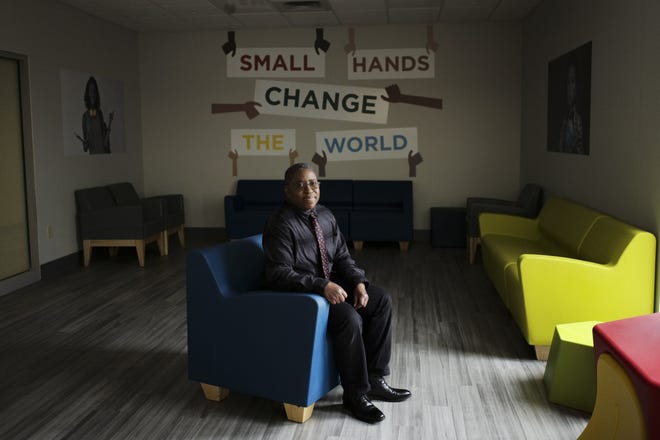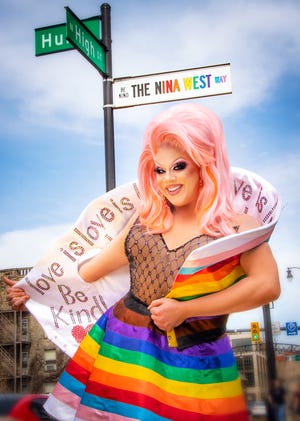
Andrew Levitt’s first exposure to mental health treatment was as a child, when his parents took him to see a therapist because they thought he might be gay.
“The initial introduction wasn’t necessarily positive, but it grew into a very positive experience,” Levitt said.
In line with his broader mission of teaching self-love and acceptance, Levitt — more commonly known by his drag queen stage name Nina West — has joined Buckeye Ranch, one of central Ohio’s oldest and best known youth services agencies, in its new campaign to promote discussions about mental health in the LGBTQ community.
The campaign, “I Wish Someone Would Have Told Me,” features video and written testimony from people about the messages they wished they had received as young people exploring and questioning their gender orientation and sexual identity. Dr. Patricia Gentile, psychiatric director at Buckeye Ranch, said the campaign aims to not only promote open conversations about mental health in the LGBTQ community, but to highlight LGBTQ-specific resources.
Health campaigns:Columbus leaders encourage LGBTQ+ community to get vaccinated for COVID
Validating people from a young age is vital to their emotional health and success — and it’s even more crucial for LGBTQ youth, Levitt said.
“LGBTQIA+ people are intrinsically told that who they are is not right by culture and society and by a mass media,” said Levitt, 42, of Columbus’ Harrison West neighborhood. “We are told that we are a blemish and we shouldn’t exist.”

Fighting loneliness, depression, mental illness
In her experience working with LGBTQ youth, Gentile said she’s noticed how a lack of validation exacerbates mental health problems.
“They’re often isolated, feel alone, feel different, feel like something’s wrong with them and don’t feel worthy,” said Gentile. “And then they have a lot of confusion about why they’re experiencing things in a different way than other people.”
A 2020 national survey showed that 40% of LGBTQ people aged 13-24 seriously considered suicide in the past year — with more than half of transgender and nonbinary youth reporting so. More than half of LGBTQ youth reported experiencing symptoms of major depressive disorder and 68% of LGBTQ youth reported anxiety symptoms in thepast two weeks, according to the report by The Trevor Project, a national nonprofit group that provides crisis intervention and suicide prevention services to LGBTQ people under the age of 25.
LGBT issues:Transgender military ban lifted by Biden, giving Ohioans hope
Before coming out as a transgender man, 24-year-old Hayden Yokum, of Bexley, came out as lesbian in high school after a friend threatened to out Yokum. His mother is lesbian and started taking Yocum to Columbus Pride when he was five and his friends were supportive.
But he was the only queer person in his friend group and felt isolated, and without anyone to talk to who understood his experience, Yokum struggled with his mental health.
“Even when I did come out then, it didn’t feel quite right still,” he said. “I went through high school, never really talked about it much or really expressed myself in the ways that I wanted to.”
Yokum said he developed depression in high school, which culminated in self-harm and suicide attempts. It wasn’t until college, where he formed friendships with other LGBTQ people, that Yocum said he was comfortable enough to explore his gender expression.
Yokum said he toyed with the idea of being transgender during college and began accepting it as part of his identity in summer 2019.
“As soon as I said it out loud to someone I was like, ‘Oh, now it feels perfect,’” Yokum said. He started testosterone in April 2020 and is currently recovering from gender confirmation surgery.
Health news:Mental health care in the Black community: ‘It helps to see someone who looks like you’
Although Yokum’s friends were supportive and understanding, not all young LGBTQ people experience the same validation upon coming out.
According to the Trevor Project’s 2020 mental health survey, one in three LGBTQ youth reported being threatened or physically harmed due to their gender orientation or sexual identity. Sixty percent of respondents experienced discrimination due to their identity, and more than a quarter of LGBTQ youth experienced homelessness, were kicked out, or ran away from home.
Levitt said repeatedly hearing harmful messages about one’s identity can make someone internalize those beliefs.
“I can’t even tell you how many times I heard, ‘Oh, you’re going to die of AIDS. You’re going to die alone. You’re gonna die young. No one’s going to love you,’” Levitt said.
Growing up the child of Christian ministers meant Rhonda Cumberbatch often felt expected to follow a “certain pattern of life.”
Cumberbatch, who uses she/him pronouns, struggled with self-esteem and grappled with worries about “not following the rules.”
Cumberbatch’s parents found it very difficult to reconcile their religious beliefs with Cumberbatch’s identity — something Cumberbatch struggled with as well.
“I got what my parents did and taught. I got why they couldn’t accept it at the time, but it didn’t make it any easier. It didn’t make it any more possible for me to feel good about me,” said Cumberbatch, an in-home clinician at Buckeye Ranch and youth advocate for the Buckeye Region Anti-Violence Organization.
‘I wish someone would have told me’
Yokum emphasized the importance of allowing people to question their identity. Looking back, he said there were times he wanted to explore the feeling of being transgender, but he was scared of being ostracized.
“Even if you feel scared yourself and you don’t want to share it outwardly yet, I think it’s really important to allow yourself to feel these things and explore them and know that it’s not as scary as it might seem,” said Yokum. He said it can be hard to remember that there are people and resources who will accept people as they are, without questioning their identity.
Without any positive representation of gay men in media growing up, Levitt said he had no example to aspire to become, he only had the negative messages that had been repeatedly told to him. He eventually found safe and uplifting people in the Columbus LGBTQ community who dismantled the stereotypes, but for so long he didn’t see success as a possibility for himself.
“I wish someone would have told me that I would have thrived, because I’m thriving,” Levitt said.
Working with LGBTQ youth solidified Cumberbatch’s appreciation and amazement at their resilience in the face of discrimination and invalidation. Cumberbatch said it is important to let LGBTQ youth know there are people and places that are safe and affirming, and that it is OK to live their authentic selves.
Most of all, Cumberbatch wanted to feel worthy, especially among family.
“I wish that they would have been able to say, ‘We see you. We appreciate you. We love you,’” Cumberbatch said.
sszilagy@gannett.com
@sarahszilagy